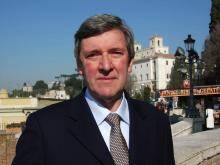The drowning of 900 migrants from many countries in the Mediterranean on the night of April 18 jolted consciences worldwide. It was but the latest, though the worst, in a series of similar tragedies in the sea between North Africa and Europe in recent years: 3,200 drowned last year, over 1,700 so far this year. Many more seem destined to follow as between 500,000 and one million migrants descend on Libya, a country on the verge of disintegration. They are ready to pay $1,000 to $2,000 to risk the perilous voyage in overcrowded ships managed by unscrupulous human traffickers.
“These are men and women like us, our brothers and sisters who sought a better life. Hungry, persecuted, wounded, exploited, victims of war, they sought a better life. They sought happiness,” Pope Francis told pilgrims in St. Peter’s Square after the latest tragedy. He appealed yet again to the international community to take action to prevent such tragedies by addressing their root causes.
Italy in particular is struggling to cope with this growing exodus of men, women and children from Middle Eastern and African countries. Last year 170,000 people made it to Italy; the number is expected to increase this year. Italy appealed to the European Union to share responsibility. The union promised vessels and funding to assist in rescue operations but little in terms of asylum. Many of the union’s 28 member states, concerned about their fragile economies and growing anti-immigrant sentiment fueled by right-wing political parties, appear ready to do almost anything to block this human tide, including bombing the ships of the human traffickers to prevent “the wretched of the earth” from boarding them and reaching Europe’s southern shores. The latter proposal is not a solution; it only addresses one extreme consequence of the turmoil in African and Middle Eastern countries. Moreover, the migrants are desperate.
The truth is that this is a growing humanitarian disaster of biblical proportions caused by armed conflicts and extreme poverty. The brunt of the disaster is being shouldered by countries in the region. Lebanon (population 4.4 million) has taken in 1.2 million Syrians fleeing war in their homeland. Jordan (population 6.7 million) has given shelter to 700,000-plus Syrians and Iraqis. Turkey provides refuge to 1.7 million Syrians. But hundreds of thousands more are fleeing conflicts, repression or extreme poverty in Mali, Somalia, South Sudan, Eritrea, the Central African Republic and elsewhere.
Europe needs to overcome what Pope Francis, visiting Lampedusa in July 2013, called “the globalization of indifference.” It needs to reform its migration policy and show greater solidarity, and it must continue to address a crisis that, as Cardinal Pietro Parolin, the Vatican secretary of state, said on April 24, must also become “a concern for every other nation in the world.”
To end the humanitarian crisis, however, and avoid further tragedies in the Mediterranean, Cardinal Parolin said, “The problem must be resolved at its roots, by eliminating the causes of extreme poverty and violence...and placing these countries in conditions where people are not forced to leave. We must do more in this respect.”
Cardinal Parolin is right: more must be done to stop the conflicts, bring peace and eliminate extreme poverty. A renewed effort must be made to end the war in Syria (population 18 million) that has already left 220,000 dead, 1 million injured and 12.2 million refugees or displaced persons. Action is urgently needed to prevent Libya from disintegrating and to stop aggression by the Islamic State. The Israeli-Palestinian conflict has to be resolved. The flow of arms to Middle Eastern countries must be stopped. A serious effort must be made to end the conflicts and eliminate extreme poverty in African countries, including Mali, South Sudan and the Democratic Republic of Congo. Only peace and economic growth can halt the exodus from Africa and the Middle East. The UN Security Council’s five permanent members must engage with other key actors, including Saudi Arabia, Qatar, Iran and Turkey, and show greater determination to end what Pope Francis calls “the third world war” that is “being fought piecemeal.” The situation is unlikely to have changed much before he addresses the United Nations in September, and one may expect him to bring that point home forcefully then.








